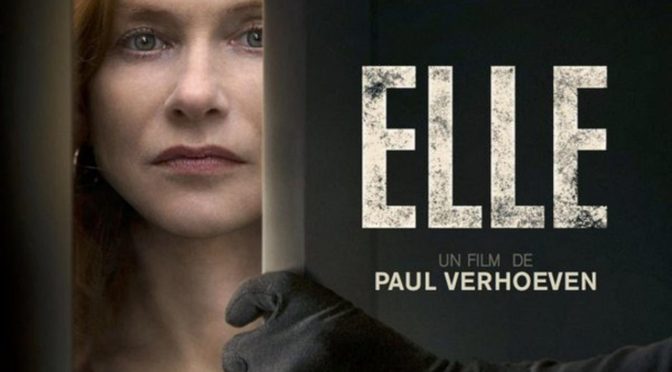Some things work in theory, but not in practice. Elle is that type of movie. Isabelle Huppert (Amour) plays Michèle LeBlanc, a woman who is raped by a masked stranger at her home. Michèle lives by herself, runs her own video game developer, and supports her less-than-capable son and mother. She is emblematic of a strong, independent woman. So strong, that after the rape, she doesn’t change anything. She doesn’t call the police and goes about her life like normal. It isn’t until a few days later that she reveals to close friends what happened. Due to a childhood trauma, she doesn’t trust the police and decides to buy pepper spray, change the locks of her house, and identify her assailant herself, believing him to be someone she knows.
Director Paul Verhoeven (RoboCop) restrains himself from being being too explicit with the actual rape scene but cannot stop himself from being pulled into more twisted ideas. After Michèle discovers the culprit, her relationship with him enters unexpected territory. There is the implication that whether it was unwanted is not as clear as we initially believed. Anytime a filmmaker decides to explore consent, he or she opens up a can of worms. The topic is both intricate and delicate. Films like Straw Dogs have used situations of possibly changing consent successfully before, but their intentions were different. Verhoeven is trying to present an ideal of a strong woman, but this wrinkle in her character undermines her fortitude. It conflicts with her previously established traits and makes later story elements feel abrupt and unearned.

That being said, there are few actresses more capable of playing this part than Isabelle Huppert. Having worked with tough directors like Michael Haneke that deal with difficult subject matter, she is perfectly equipped to tackle the challenging role. Huppert, now 63, is absolutely convincing in her determination. She is the type of woman who runs her business, runs her family, and is not about to let anyone get in the way of that. Her performance is the only aspect making the character believable. It is also exciting to see the type of work she does. Rarely, if ever, has an older woman been portrayed leading an industry dominated by young men. She is confronted by employees who don’t believe she is qualified to be in her line of work, but quickly shuts them down with her knowledge and conviction. The issue, that is no way to be blamed on Huppert, is the character’s response to her assault.
There is a kind of faux-feminism on display here. Verhoeven presents Michèle’s handling of her attack as an ideal to be strived towards. Of course, a person capable of immediately moving on after such a violent experience would be an incredibly resilient individual, but the absence of any sort of emotional fallout here is troublesome. By ignoring these after effects, Verhoeven implicitly denies the long-lasting trauma rape survivors face. He asserts that it is possible, or even best, to simply move on and get back at the attacker. This isn’t necessarily surprising given that he is the same man who directed films like Showgirls and Basic Instinct, but it is still unacceptable. In fact his presentation can be viewed as the stereotypical, and emotionally safe, male response. Don’t feel things! Just get revenge!
It could, incorrectly, be argued that Verhoeven is aiming for more genre fare. Elle might be interpreted as a modern, arthouse take on films like I Spit on Your Grave, but it’s clear that the director has a much loftier impression of his own work. He is attempting to create a role model of how to deal with this type of attack, but isn’t willing to fully explore its aftermath. Verhoeven chooses to neglect the complex emotional damage of sexual assault in favor of a simplistic and often perverted revenge story.

2/5 stars.
